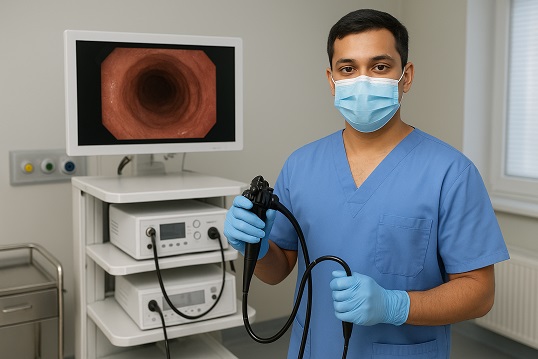Stories you may like
Endoscopy Technician
Endoscopy technicians work closely with physicians, nurses, and other medical staff to ensure the efficient and safe use of endoscopes, which are instruments equipped with cameras and lights used to visualize internal organs and structures. The work of endoscopy technicians contributes to the overall effectiveness of endoscopic examinations and ensures a smooth workflow in healthcare settings where these procedures are performed.
Duties and Responsibilities
Endoscopy technicians have a range of duties and responsibilities that revolve around supporting medical professionals during endoscopic procedures. Here are the key responsibilities of an endoscopy technician:
- Equipment Preparation: Sterilize, assemble, and set up endoscopic equipment before procedures. Ensure that all instruments, including endoscopes and accessories, are in proper working condition.
- Procedural Support: Assist physicians, nurses, and other healthcare professionals during endoscopic examinations and procedures. Hand instruments to the medical team, adjust equipment as needed, and anticipate the requirements of the procedure.
- Patient Preparation: Prepare and position patients for endoscopic procedures, providing comfort and reassurance. Verify patient information, explain the procedure, and address any questions or concerns.
- Cleaning and Disinfection: Clean and disinfect endoscopic equipment and instruments after each use, following established protocols and infection control guidelines. Ensure compliance with safety and hygiene standards to prevent the risk of infections.
- Documentation: Maintain accurate and detailed records of procedures, equipment usage, and patient information. Document any issues or complications that arise during procedures.
- Inventory Management: Monitor and manage inventory of endoscopic supplies and accessories. Order, restock, and organize supplies to ensure that the necessary items are readily available.
- Quality Control: Participate in quality control and assurance activities to maintain the highest standards in endoscopy services. Report any equipment malfunctions or deviations from established protocols.
- Patient Care: Provide post-procedure care and instructions to patients. Monitor patients for any adverse reactions or complications and report findings to the healthcare team.
- Communication: Communicate effectively with the healthcare team, patients, and other staff members. Collaborate with physicians and nurses to ensure a coordinated and efficient workflow.
workplace of an Endoscopy Technician
Endoscopy technicians typically work in medical facilities such as hospitals, ambulatory surgical centers, specialty clinics, and endoscopy centers. The workplace of an endoscopy technician is characterized by a dynamic and collaborative environment centered around the performance of endoscopic procedures. These professionals are an integral part of the healthcare team, working alongside physicians, nurses, and other medical staff to ensure the smooth execution of endoscopic examinations.
The primary workspace for endoscopy technicians is the endoscopy suite, where various endoscopic procedures are conducted. This suite is equipped with advanced endoscopic equipment, monitors, and sterile instruments. The technician is responsible for preparing the examination room, ensuring that all instruments are sterilized and functioning correctly, and assisting with patient preparation. The fast-paced nature of the endoscopy suite requires technicians to be adept at multitasking and responding promptly to the needs of the medical team and patients.
In addition to the endoscopy suite, endoscopy technicians may also work in sterilization and reprocessing areas where they clean, disinfect, and sterilize endoscopic instruments between procedures. Some technicians may be involved in inventory management, ensuring that necessary supplies and equipment are readily available. Given the critical role of endoscopy technicians in maintaining a sterile and efficient environment, their work contributes directly to the delivery of high-quality patient care in gastroenterology, pulmonology, urology, and other medical specialties that utilize endoscopic procedures.
How to become an Endoscopy Technician
Becoming an endoscopic technician involves a combination of education, training, and practical experience. Here is a guide to help you pursue a career as an endoscopic technician:
- Educational Requirements: Obtain a high school diploma or equivalent. Focus on science-related courses, such as biology and chemistry, as a strong foundation for medical training.
- Enroll in a Relevant Program: Pursue a formal education program in surgical technology, endoscopy technology, or a related field. Many community colleges, vocational schools, and technical institutes offer programs that provide the necessary skills and knowledge for a career as an endoscopic technician.
- Program Accreditation: Choose a program accredited by the Commission on Accreditation of Allied Health Education Programs (CAAHEP) or the Accrediting Bureau of Health Education Schools (ABHES). Accreditation ensures that the program meets industry standards.
- Clinical Training: Participate in clinical training as part of your educational program. Clinical experience allows you to gain hands-on skills in an actual healthcare setting, including exposure to endoscopic procedures.
- Certification: While certification is not always required, obtaining certification can enhance your credibility and job prospects. The Certification Board for Sterile Processing and Distribution (CBSPD) offers the Certified Flexible Endoscope Reprocessor (CFER) certification, which is relevant to endoscopic technicians involved in reprocessing.
- Obtain Basic Life Support (BLS) Certification: Many employers require endoscopic technicians to have Basic Life Support (BLS) certification. This certification ensures that you are trained in essential life-saving techniques.
- Gain Practical Experience: Seek internships or externships to gain practical experience in an endoscopy or surgical setting. This hands-on experience is valuable for applying theoretical knowledge in real-world scenarios.
- Job Search and Application: Look for job openings for endoscopic technicians in hospitals, outpatient clinics, endoscopy centers, and other healthcare facilities. Tailor your resume and cover letter to highlight your education, training, and relevant experience.
Skills needed for an Endoscopy Technician
Technical Skills
- Knowledge of Endoscopic Equipment – Understanding how to operate, set up, and troubleshoot endoscopes, cameras, monitors, and related instruments.
- Sterilization Techniques – Proficiency in cleaning, disinfecting, and maintaining endoscopy tools to meet strict infection-control standards.
- Medical Terminology – Familiarity with gastrointestinal, pulmonary, and surgical terminology used in endoscopy procedures.
- Patient Monitoring – Ability to check vital signs, recognize abnormalities, and assist in patient safety during procedures.
- Specimen Handling – Collecting, labeling, and preparing biological samples for laboratory analysis.
Clinical & Support Skills
- Assisting Physicians – Supporting gastroenterologists or surgeons during diagnostic and therapeutic endoscopic procedures.
- Emergency Response – Knowing basic life support (BLS) and how to respond to complications such as bleeding or breathing issues.
- Documentation – Recording patient information, procedure details, and equipment use accurately.
Soft Skills
- Attention to Detail – Ensuring sterile environments, accurate labeling, and proper equipment handling.
- Communication – Explaining procedures, preparing patients, and coordinating with healthcare staff.
- Teamwork – Working effectively with doctors, nurses, and other technicians in a fast-paced clinical setting.
- Empathy & Patient Care – Providing comfort and reassurance to patients who may be anxious or uncomfortable.
- Time Management – Managing multiple procedures and ensuring quick equipment turnaround.
Additional beneficial skills: Computer literacy (for electronic health records), problem-solving, and adaptability to new endoscopy technologies.
Salary of Endoscopy Technician
India
- Entry-level: ₹2.5 – ₹4.5 LPA
- Mid-level (3–5 years experience): ₹4.5 – ₹6.5 LPA
- Senior / Specialized Technicians: ₹7 – ₹10 LPA or higher (especially in private hospitals, metro cities, or specialized GI centers).
United States
- Entry-level: \$35,000 – \$45,000 per year
- Mid-level: \$45,000 – \$55,000 per year
- Experienced/Senior: \$60,000 – \$70,000+ per year (depending on hospital, specialization, and location).
Other Countries
- UK: £22,000 – £32,000 annually
- Middle East (UAE, Saudi, Qatar): AED 6,000 – 12,000/month depending on experience and employer.
Career Outlook & Growth
Entry-Level Roles
- Endoscopy Technician / GI Technician in hospitals, diagnostic centers, and clinics.
- Responsible for setting up equipment, assisting physicians, and sterilizing instruments.
Mid-Level Growth
- Senior Endoscopy Technician – More responsibility in supervising procedures and training junior staff.
- Specialization – GI endoscopy, bronchoscopy, urology, or surgical endoscopy assistance.
- Opportunities to cross-train into related fields like Surgical Technology, Nursing Assistance, or Gastroenterology Lab Management
Advanced Career Path
- Endoscopy Unit Manager / Supervisor – Leadership roles in managing staff, equipment, and scheduling.
- Clinical Educator / Trainer – Teaching in endoscopy technician programs.
- Transition to Nursing or Allied Health Careers – With further studies, many technicians advance to Registered Nurse (RN), Surgical Assistant, or Physician Assistant roles.
Job Demand
- High Demand – Driven by rising gastrointestinal diseases, cancer screenings, and minimally invasive procedures worldwide.
- Hospitals, gastroenterology labs, day-care surgical centers, and diagnostic clinics actively hire trained endoscopy technicians.








User's Comments
No comments there.